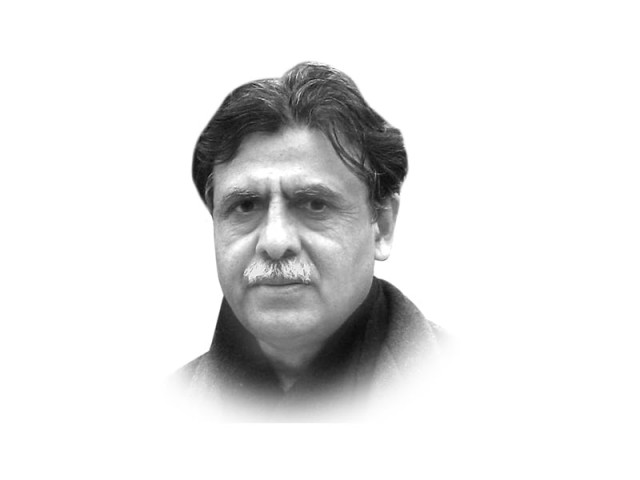Beyond the surgical strike
The trail of events has brought Pakistan-India relations to a flashpoint

The writer is an author, a public policy analyst and former interior secretary. He teaches at LUMS
While India has gained in optics in many ways, the claim has left some basic questions unanswered. How in a fiercely contested nuclear region, with an undeclared war-like situation, a surgical strike very close to the LoC, remained unanswered and unaddressed by Pakistan’s forces. Having served in a number of districts along the Indian border, I recall that areas within a radius of 5km of the zero line are not only categorised as restricted but are also highly militarised and the security forces stationed here can only be complacent at their own peril even during peace time. These are virtual cantonments and logic suggests that any attack on cantonments will be repulsed with there being casualties among those who perpetrate such an attack. The attack on Pathankot and Uri cantonments are vivid examples, which resulted in the killing of the attackers as well. The Indian reasoning portrays as if Pakistan’s forces were just sitting ducks and were watching the destruction of their so-called strategic assets for hours without taking any action. Despite the hollowness of the claim, India has been able to leverage it in assuaging the hunger for war inside the country, gaining mileage on the domestic front. This also conveyed the message to the world that India’s sole object was to destroy terror structures along the LoC, a message which syncs well with the Western mantra. According to Indian analysts, the surgical strike, while raising the nuclear threshold, has also created space for India to carry out hot pursuits inside Pakistan. This reasoning is fraught with danger as it ignores the flip side. It may well have created space for India but it has also created even more space for non-state actors for their militant forays. India has indeed exposed its limitation to adversaries by touting its alleged action as a surgical strike, which is indeed no more than an exchange of heavy artillery fire in the war game. On the diplomatic front, India has been able to extract a favourable statement from the US, which while condemning the Uri incident, calls upon Pakistan to delegitimise UN-sanctioned outfits and their affiliates.
What should Pakistan be doing in this scenario? We first need to put our act together. We need to be far more anticipative in our approach. After Uri, India’s refusal to participate in the Saarc conference was always on the cards. Keeping in mind the Indian rant of isolating Pakistan, there was a need to formally announce the postponement of the conference immediately after India’s refusal rather than waiting for the refusals of Bangladesh, Bhutan, Afghanistan and finally Sri Lanka. The latter member went an extra mile. When declining to participate in the moot, there was some mention of buzzwords of terrorism, which were not only used out of context but diplomatically misplaced as well. From personal experience, I know that in Saarc moots, the smaller countries invariably throw their weight behind Pakistan but this time it is the other way round. The Foreign Office needs far more kinetic energy than displayed at present to take the lead in such matters and sensitise the political leadership to help improve its sense of timing. Pakistan also needs to rebalance its end objectives and the set of means to achieve them. We need to answer very hard questions that are weighing on the minds of the world at large. Mere disavowal of militant outfits is not leading us anywhere. We shouldn’t be victims of double speak. Pakistan seeks implementation of UN resolutions on Kashmir. It has consistently pitched the Kashmir cause on the moral high ground of the UN Security Council resolutions. Its own efforts to rein in jihadist outfits, which are under UNSC sanctions, fall far short of international expectations. This has also been to the dismay of parliament where voices are now rising, urging the reining in of these elements as they do not serve the image of the country in a highly gridded world. It is also hurting the Kashmir cause. Parliamentarians recently visited world capitals to highlight Indian excesses against the people of Kashmir. Instead they were faced with a barrage of searching questions about the leaders of these outfits who continue to move within the country with gay abandon. Pakistan needs to clamp down on their visibility and relevance. We have much at stake and need to ensure that non-state actors from within or from across the LoC are in no position to cast a shadow on the genuine, pristine struggle of Kashmiris which they are fighting without remit. Wise nations make amends and learn from their historically inept policy options. India and Pakistan should realise that every problem has a way out, if not a solution. They have to come to the dialogue table. If the earlier leadership of the two countries could hammer out the Indus Waters Treaty and the Simla agreement in the 1960s and 1970s under trying circumstances, then what stops us from making use of endurable frameworks. Militancy and cross-border incursions are phenomena of the 1990s but the two countries were able to agree to a ceasefire which lasted from 2002 to 2008. It was during this time when India and Pakistan were close to coming to an out-of-the-box solution to the Kashmir problem. The leadership in the two countries have to rise to the occasion and wrest the initiative before time slips out of their hands again.
Published in The Express Tribune, October 18th, 2016.
Like Opinion & Editorial on Facebook, follow @ETOpEd on Twitter to receive all updates on all our daily pieces.














COMMENTS
Comments are moderated and generally will be posted if they are on-topic and not abusive.
For more information, please see our Comments FAQ